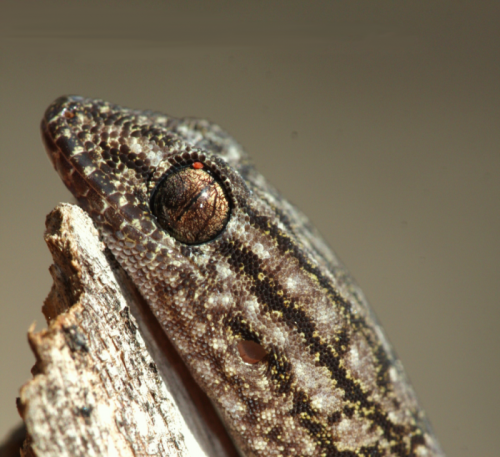Copyright Paul Edward Duckett
(Phys.org) —New research from Macquarie University suggests that arid zone reptiles could struggle to find suitable homes as a result of human induced climate change.
In a study, published in the journal Diversity and Distributions, the team led by PhD researcher Paul Duckett, used a new modelling technique to predict if the Australian gecko; the Tree Dtella (Gehyra variegata), could successfully move from one location to another as climates changed.
While previous studies have focused on predicting those regions that will become suitable for species to live in the near future, this research has measured a species ability to even make the journey in time
"The real question isn't where they are going but can individuals actually reach a suitable new home before it becomes critical to their survival," says Duckett.
The team calculated the gecko's current and future distribution and compared this to how far they were capable of moving each year. They were then able to evaluate if the gecko could successfully move between these two points as climates changed.
"While we were able to identify suitable habitats for these geckos, our model showed that almost half of the populations would fail to get to these areas in time," says Duckett.
Researchers say as temperatures increase, arid species in Australia will need to shift southward in order to avoid unbearably hot conditions. If they fail to keep pace with the climatic shift they are unlikely to survive.
"As atmospheric greenhouse gases continue to increase throughout the next century it will put species at risk. Areas that were once favourable for many species to live are rapidly becoming inhospitable. This current rate of climatic change is alarming and has already resulted in the localised extinction of some lizard species in Mexico," says Duckett.
Researchers say these predictions are valuable for conservation programs and can be used to focus on relocating vulnerable species not able to reach better habitats without assistance.
"The results are likely to apply to a range of similar Australian reptile species," says Duckett.
More information: Wilson, P. et al. Keeping up with the neighbours: using a genetic measurement of dispersal and species distribution modelling to assess the impact of climate change on an Australian arid zone gecko (Gehyra variegata), Diversity and Distributions, 11 March 2013. onlinelibrary.wiley.com/doi/10.1111/ddi.12071/full
Journal information: Diversity and Distributions
Provided by Macquarie University




.jpg)


















